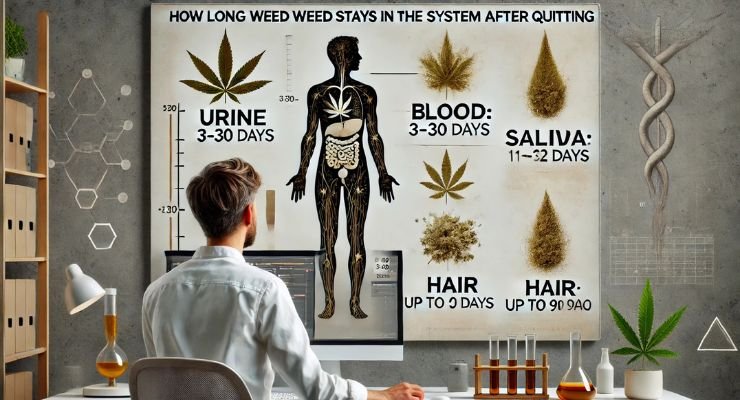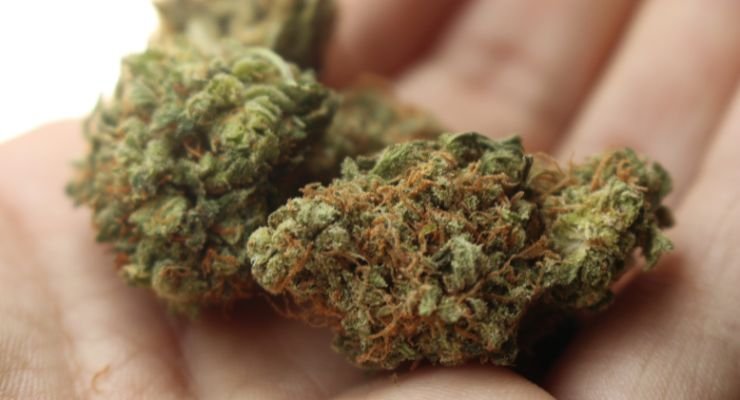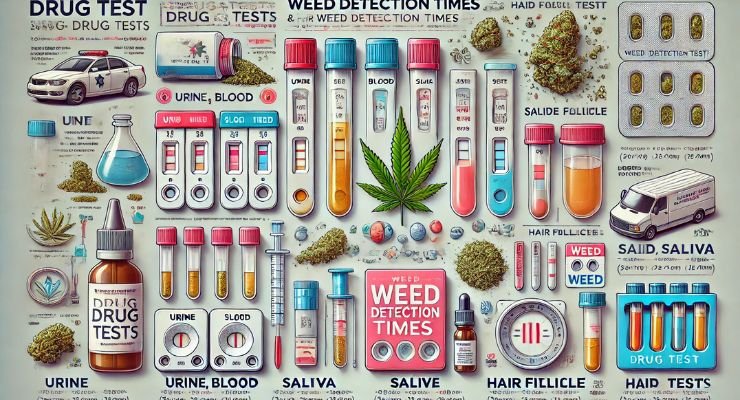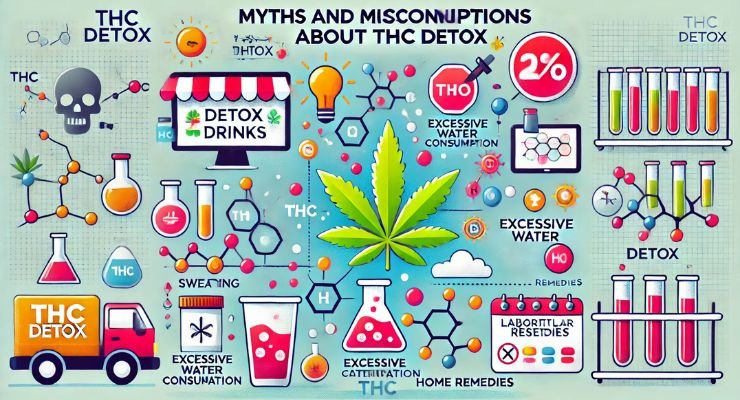
If you’ve recently quit smoking weed or are thinking about it, one question you might have is, “How long does weed stay in your system after quitting?” It’s a common concern, especially if you are facing a drug test or just want to understand the detox process better. Cannabis has become increasingly popular as both a recreational and medicinal substance, particularly with the rise in legalization across many parts of the world. However, despite its growing acceptance, there is still a lot of mystery surrounding how the body processes cannabis and how long its effects linger in your system after you stop using it.
The fact is, the answer to how long weed stays in your body depends on a variety of factors. These include the frequency of use, your body’s metabolism, how much cannabis you consumed, and the method of consumption. Additionally, individual factors such as your body fat percentage and overall health can all influence how quickly THC (tetrahydrocannabinol), the psychoactive compound in cannabis, leaves your system. This article aims to provide you with detailed insights into how long cannabis stays in your system after quitting and the factors that play a role in the detoxification process.
How Weed is Processed in the Body
When you consume cannabis, whether by smoking, vaping, or eating edibles, your body absorbs THC, the primary active ingredient in marijuana. THC enters your bloodstream rapidly if smoked or vaped, but if you consume edibles, the absorption process takes longer because the cannabis must first be digested in the stomach and metabolized by the liver. Regardless of the method of consumption, the process is essentially the same: THC is metabolized by the liver into various metabolites, which are then stored in fat cells throughout your body.
The fat-soluble nature of THC is a key reason why cannabis can stay in your system for a long time. THC and its metabolites are stored in your fat cells, and since fat cells release THC slowly over time, it can remain detectable in your system for weeks or even months after your last use. This is why regular cannabis users, who have more THC stored in their fat cells, may find that THC remains in their system much longer than occasional users.
Factors That Influence How Long Weed Stays in Your System

The length of time that THC stays in your system can vary based on several factors. Understanding these factors can give you a better idea of how long weed will stay in your body after quitting.
1. Frequency & Amount of Use
One of the most important factors influencing how long weed stays in your system is how often you use it. The more frequently you use cannabis, the more THC will build up in your system. For occasional users, THC might be cleared from the body relatively quickly—usually within 3 to 7 days. However, for regular users, or those who use cannabis multiple times a week or every day, THC can accumulate in the body and take much longer to be eliminated.
For chronic users, especially those who use cannabis multiple times a day, it may take weeks or even months for THC to leave their system. The more cannabis you consume, the longer the metabolites can linger in your system, primarily because they are stored in fat cells and are gradually released over time.
2. Metabolism Rate
Your metabolism plays a significant role in how quickly your body processes and eliminates substances, including THC. Individuals with faster metabolisms typically eliminate THC from their bodies at a quicker rate compared to those with slower metabolisms.
Factors like age, genetics, and lifestyle can influence your metabolism.
- Age: Younger individuals generally have faster metabolisms than older individuals. As we age, metabolic rates tend to slow down, which can result in longer detox times for older people compared to younger people.
- Genetics: Genetic factors can determine the efficiency of your metabolism. Some people are naturally predisposed to a faster metabolism, while others may process substances more slowly.
- Physical activity: Individuals who exercise regularly tend to have faster metabolisms because exercise increases metabolic rates and helps the body burn fat. A faster metabolism helps the body eliminate THC more efficiently.
3. Body Fat Percentage
THC is fat-soluble, meaning it binds to fat cells in the body and is stored there. This is why body fat percentage is one of the most critical factors in how long cannabis stays in your system. People with higher body fat percentages tend to retain THC for a longer period because THC is stored in fat cells, which release it slowly over time.
If you have a higher body fat percentage, your body will store more THC, and it may take longer for it to be fully eliminated. Conversely, individuals with lower body fat will generally metabolize and eliminate THC more quickly. This is especially important for regular cannabis users who may have more THC stored in their fat cells.
4. Hydration & Diet
Hydration plays a role in detoxification, but it doesn’t “flush out” THC in the way many people believe. Staying well-hydrated supports your kidneys in filtering out waste products from your body, including THC metabolites. However, drinking excessive amounts of water won’t immediately rid your body of cannabis.
A healthy diet can also impact how quickly THC leaves your system. Foods that promote liver function, such as leafy greens, fruits, and vegetables, can support the detoxification process. Cruciferous vegetables like broccoli and cauliflower, for example, are known for their ability to help the liver detoxify. Eating high-fiber foods can also assist in eliminating waste, as fiber helps bind to toxins and promotes bowel regularity.
5. Method of Consumption
How you consume cannabis affects how long it stays in your system. Smoking or vaping cannabis results in THC being absorbed directly into your bloodstream, which leads to a faster onset of effects and quicker metabolism of the substance. However, this also means that the THC will be processed and eliminated more rapidly compared to edibles.
Edibles, on the other hand, are absorbed through the digestive system and metabolized in the liver, which leads to a slower onset of effects and a longer processing time. As a result, THC from edibles tends to stay in the body for a longer period than THC from smoking or vaping.
6. Overall Health & Activity Level
Your overall health can influence how long THC remains in your system. People who maintain a healthy lifestyle with regular exercise, a balanced diet, and adequate sleep generally detoxify more efficiently than those who are sedentary or unhealthy. Regular exercise helps burn fat, and as fat is burned, THC metabolites are released into the bloodstream and eliminated from the body.
Additionally, getting enough sleep and managing stress levels can support your body’s natural detox processes, as the body uses sleep to repair and regenerate cells, including those involved in detoxification.
Weed Detection Times in Different Drug Tests

When it comes to drug testing, it’s essential to understand how long THC can be detected in various types of tests. Different tests have different detection windows based on the type of sample being tested.
1. Urine Tests
Urine tests are the most common form of drug testing, and they have varying detection windows depending on how often you use cannabis.
- One-time user: THC may be detectable in urine for 3-7 days.
- Occasional user (2-3 times per month): THC can stay in your urine for 7-14 days.
- Regular user (once a week): THC may be detectable for 14-30 days.
- Heavy user (daily or multiple times per day): THC can remain detectable for 30-60 days or more.
2. Blood Tests
Blood tests are typically used to detect recent cannabis use, such as in cases of suspected impaired driving. THC is detectable in the blood for a much shorter period compared to urine:
- One-time user: THC can be detected in the blood for up to 2 days.
- Frequent or heavy users: THC may be detectable for 1 week or longer.
3. Saliva Tests
Saliva tests are used to detect recent cannabis use and have a shorter detection window than urine or blood tests. THC can stay in saliva for 1-3 days after consumption.
4. Hair Follicle Tests
Hair follicle tests are the most comprehensive in terms of detection time, with THC detectable in hair for up to 90 days. These tests are generally used in situations where a long detection window is necessary, such as in workplace drug testing or forensic cases.
How Long Does Weed Stay in Your System?
The length of time THC stays in your system can vary based on how often you use cannabis:
- One-time user: THC is typically detectable for 3-7 days.
- Occasional user (2-3 times per month): THC may stay in your system for 7-14 days.
- Regular user (once a week): THC can remain detectable for 14-30 days.
- Heavy user (daily or multiple times per day): THC may stay in your system for up to 30-60 days, or even longer.
How to Speed Up the Detox Process
If you want to speed up the detox process, here are some tips:
- Hydration: Drink plenty of water to stay hydrated. Although water alone won’t “flush” THC out of your system quickly, it supports overall detoxification.
- Exercise: Regular exercise, especially cardio, helps burn fat and release stored THC metabolites from fat cells.
- Diet: Eat a healthy, balanced diet rich in detoxifying foods, such as leafy greens, cruciferous vegetables, and fiber-rich fruits. A healthy diet supports your liver and overall detoxification.
- Avoid detox products: Many detox drinks and pills claim to help you pass drug tests, but these often don’t work and can contain harmful ingredients. It’s better to rely on natural detox methods like hydration, exercise, and a healthy diet.
Myths & Misconceptions About THC Detox

There are several myths surrounding THC detoxification. Here are some common misconceptions:
- Drinking excessive water won’t magically flush THC out of your system. While staying hydrated is important, drinking too much water won’t instantly eliminate THC.
- Cranberry juice, vinegar, or bleach won’t help you pass a drug test. These are myths with no scientific basis.
- Exercising right before a test won’t significantly impact your THC levels in the short term. While regular exercise is helpful for long-term detox, it won’t provide an immediate solution.
- Secondhand smoke is unlikely to make you test positive unless you’re exposed to significant amounts of smoke over a long period.
What to Do If You Have a Drug Test Coming Up?
If you have a drug test coming up, consider the following:
- Know your detox timeline: If you’ve been using cannabis regularly, plan ahead since it can take weeks or even months for THC to clear your system.
- Test yourself: Use a home drug testing kit to check if THC is still detectable in your system before an official test.
- Understand your rights: In places like Canada, cannabis use is legal, but some employers still have policies regarding drug testing. Familiarize yourself with your legal rights.
- Be prepared: If you do test positive, remain calm and be open to discussing your options with your employer or testing agency.
Conclusion
The length of time that weed stays in your system depends on various factors, including how often you use cannabis, your metabolism, body fat percentage, and the method of consumption. Regular users may experience longer detox times compared to occasional users, with THC lingering in the system for weeks or even months in some cases. While the detox process can take anywhere from a few days to a couple of months, it is important to remember that each individual’s body processes cannabis differently. The key to supporting your body during this time is to focus on natural detoxification methods such as staying hydrated, engaging in regular exercise, and maintaining a healthy, balanced diet. These lifestyle factors can help to speed up the process by promoting fat burning, supporting liver function, and encouraging the elimination of waste.
Patience is crucial throughout this process. Trying to rush your body’s natural detoxification or relying on unproven detox products may not yield the desired results and could potentially be harmful. It’s best to trust your body and give it the time it needs to cleanse itself effectively. Additionally, it’s important to avoid drastic measures or extreme detox solutions that promise quick fixes. These often do more harm than good and may only delay the natural detox process.
By understanding how your body processes cannabis and the factors that affect how long THC can remain in your system, you can better prepare for any upcoming drug tests, making informed decisions about when to take them or how to manage the situation. Furthermore, embracing a holistic approach to detoxification, including proper hydration, exercise, and diet, can help ensure that your body detoxifies effectively and safely. Ultimately, the more informed you are about the process, the better equipped you’ll be to manage your detox journey and feel confident in your ability to clear THC from your system naturally.
Frequently Asked Questions
For occasional users, cannabis may stay in your system for about 3 to 7 days. Occasional use typically means consuming cannabis a few times a month, so the THC doesn’t accumulate as much in your body as it would for regular or heavy users. However, individual factors like metabolism, body fat percentage, and how much cannabis was consumed can affect this timeline.
Yes, exercising can help speed up the detox process, especially when it involves activities that promote fat burning. Since THC is stored in fat cells, engaging in regular cardiovascular exercise like running, cycling, or swimming helps burn fat and release THC metabolites into your bloodstream, eventually eliminating them through sweat and urine. However, this process takes time and won’t produce immediate results.
For heavy or daily users, THC can stay in your system for a significantly longer period, often anywhere from 30 to 60 days, and sometimes even longer. This is because regular cannabis use results in THC building up in your fat cells over time. The more often you use cannabis, the more it accumulates, making it harder for your body to eliminate it quickly.
Several factors can influence how long THC remains detectable in your body, including:
- Frequency of use: The more frequently you use cannabis, the longer it will stay in your system.
- Metabolism: People with faster metabolisms will generally clear THC more quickly.
- Body fat percentage: THC is fat-soluble, meaning people with higher body fat percentages will retain THC for longer.
- Age: Younger people tend to metabolize THC more quickly than older individuals.
- Hydration and diet: Staying hydrated and eating detoxifying foods can support your body’s natural detox processes.
Yes, THC can be detected in a blood test, but it typically remains in the blood for a much shorter period than in urine or hair follicle tests. For occasional users, THC may be detectable in the blood for up to 2 days after use, while regular users could have detectable levels for up to a week or more. Blood tests are more commonly used for situations where recent cannabis use is being evaluated, such as in the case of impaired driving.
While staying hydrated is important for overall health and can help your kidneys filter waste products, drinking excessive amounts of water will not instantly flush THC out of your system. It’s a common misconception that water can speed up detoxification, but it can support your body’s natural processes. The body eliminates THC over time through natural metabolic processes, so drinking water can be helpful, but it won’t drastically reduce the time it takes to clear THC from your system.
Home drug tests can be relatively accurate, but they are not foolproof. These tests typically detect THC metabolites in urine, and the detection window varies depending on your usage patterns. For occasional users, they may detect THC metabolites within 7 days, but for regular or heavy users, these tests may still show positive results even after a month or longer. It’s important to follow the test instructions carefully and consider testing yourself multiple times for accuracy.
Secondhand smoke exposure can result in trace amounts of THC being present in your system, but it’s unlikely to cause a positive drug test unless you’re in an environment with significant, prolonged exposure to cannabis smoke. Generally, unless you’re inhaling cannabis smoke regularly or in large quantities, secondhand smoke will not lead to a positive result in a drug test.
Many detox products claim to help users pass drug tests by “flushing” THC from the system, but their effectiveness is highly questionable. Some of these products, like detox drinks or pills, may temporarily dilute urine or mask the presence of THC, but they won’t eliminate the drug from your system. It’s best to avoid these products and focus on natural detoxification methods like exercise, hydration, and a healthy diet.
The time it takes to feel “normal” after quitting cannabis varies from person to person. Some individuals may experience withdrawal symptoms like irritability, anxiety, and difficulty sleeping for several days to a couple of weeks. However, after this period, most people will start to feel more balanced and return to their normal physical and mental state. If you were a regular user, your body may need time to adjust to not having cannabis, but these symptoms generally fade with time.
The best way to detox from cannabis is through a combination of natural methods:
- Hydrate: Drink plenty of water to support your kidneys and urinary system.
- Exercise: Engage in regular physical activity, especially cardio, to help burn fat and release stored THC.
- Healthy Diet: Eat a balanced diet with plenty of fiber, fruits, vegetables, and foods that promote liver detoxification, such as cruciferous vegetables.
- Sleep: Ensure you’re getting enough rest, as sleep plays a crucial role in the body’s detoxification and recovery processes.
It’s important to remember that detoxing takes time, and there are no shortcuts to speeding up the process in a healthy and effective way.
THC can stay in saliva for about 1 to 3 days, depending on how often you use cannabis. For occasional users, THC may be detectable for a shorter period, but for regular or heavy users, it may remain detectable for a longer time. Saliva tests are often used to detect recent cannabis use, so if you haven’t used cannabis in the past few days, it’s unlikely you’ll test positive.

